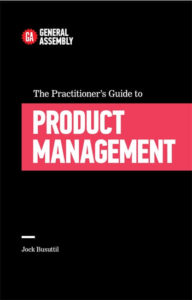
PRODUCTHEAD: Seeking control in a crisis
PRODUCTHEAD is a regular newsletter of product management goodness,
curated by Jock Busuttil.
product of war #
tl;dr
62% of product leaders surveyed say the downturn has led to product being more valued in the organisation
In a downturn, track how customers reassess priorities, reallocate funds, switch brands, and redefine value
Silicon Valley Bank was the second biggest banking failure in US history
SVB’s collapse leaves a knowledge gap in financial institutions that understand the tech sector
every PRODUCTHEAD edition is online for you to refer back to
hello
I’m writing this on the train into London for my first proper networking event since before the pandemic. Angry grey thunderclouds surround the train and licks of lightning flicker in the nearby fields.
It’s often said that product managers need to be comfortable with uncertainty. That’s certainly true. The rest of the organisation can be … less so. A crisis can provoke some especially wild reactions. We’re seeing some of these right now.
A tech sector in crisis (again) #
As Charles Read writes in The Conversation UK, Silicon Valley Bank (SVB) collapsed as a result of a rapid surge in US interest rates (0.5% to 4.5% in 12 months) coupled with short-term interest rates rising above long-term interest rates. This was a problem for SVB because it was taking short-term deposits from the tech sector and tying them up in long-term investments (bonds).
In the pandemic, tech startups had plenty of easy, spare cash sloshing about from generous funding rounds. So they put it into short-term investments with SVB. Later, with venture capital investment drying up, all those tech firms set about withdrawing their short-term deposits — which meant SVB had to sell its long-term bonds at a loss. Sensing a problem, more companies started to withdraw their deposits, exacerbating the problem and causing SVB to spiral into collapse.
Suddenly tech companies are freaking out. They’re all suffering from an acute loss of control because global events are overtaking them (again).
Management teams feel like they’re drowning, so they grasp at approaches that provide the façade of stability, regardless of whether it’s rational to do so. This translates into visceral trauma responses such as fight (attack the situation), flight (escape the situation) or freeze (ignore the situation).
Their profligate hiring sprees have come back to bite them (employees are expensive), so extensive lay-offs have been a predictable and painful reaction. They slash outcome-focused product initiatives in favour of those that have the most direct effect on “the bottom line”, even if that’s short-sighted (revenue is an output, not an outcome). Their appetite for risk has almost entirely vanished.
But it’s okay! Because AI will save us all! #
Despite this pronounced aversion to risk, suddenly every company seems to be betting the farm on AI. At a recent networking event, one of the panellists asked the audience of product leaders: “Who in here has had someone in your leadership team ask what your AI strategy is in the last three months?” To laughs, most of the audience raised their hands.
The “miracle” of large language models such as GPT-4 (OpenAI), PaLM-E (Google) and LLaMa (Meta) presents tech companies with the proverbial Hail Mary pass — a long shot, made in desperation with a very small likelihood of success, that requires divine intervention to succeed.
Because generative AIs are relatively poorly understood, and yet appear so magical, it is tempting to think they can solve any problem. The reality is that they’re just another tool: useful in certain situations, but not in all.
The psychology of the sure-thing longshot #
Thanks to cognitive bias (yay!), we can trick ourselves into thinking the remote possibility of success is more likely than it is, because we find it extremely easy to imagine how great winning would be. Combined with the acute feeling of a loss of control, that goes some way to explaining what state of mind your boss and management team may be in.
So where we can, product managers need to help the others in their organisation to work through the feeling of being out of control. We need to deftly shine a light on irrational decision-making, while not making people feel dumb or even more out of control than they are. When someone is drowning, it’s not the time to critique their swimming.
We have to be extra careful at picking our battles, because in times of crisis both rational and irrational views will be that much more entrenched. And we have to remind ourselves that the boss may be right to force a short-term play if it means their company can survive for another month.
When we start to emerge from the crisis, and people are no longer exhibiting fight, flight or freeze responses, that’s when we can help them to entertain more risk and look further ahead again.
Speak to you soon,
Jock
what to think about this week
How organisations are supporting product during economic downturn
Inflation is up. Revenues are down. Budgets and headcount are frozen or shrinking. These are just some of the complex challenges an economic downturn poses to companies looking to navigate the future successfully. But there’s a silver lining. In meeting these challenges, organisations are forced to narrow their focus. They’re building for a better tomorrow by investing in their most significant opportunity. But what is that exactly?
The role of product is only more important now
[Louron Pratt / Mind The Product]
Leading product teams in times of change
We all know that we are currently facing a difficult time in the economy. So when a ‘shiny new object’, like ChatGPT, comes along, we learned that it’s important to not get carried away with immediately restructuring all of your plans around it.
There are still things to be positive about
[Alivia Kasumov / Mind The Product]
How to market in a downturn (2009)
Consumers in a recession can be divided into four groups. … All groups prioritize consumption by sorting products and services into the following categories: essentials (central to survival or well-being), treats (justifiable), postponables (can be put off), and expendables (unnecessary or unjustifiable).
Purchases depend on disposable income
[John Quelch & Katherine E. Jocz / Harvard Business Review]
Silicon Valley Bank’s focus on startups was a double-edged sword
Silicon Valley Bank focused on the startup sector, and that’s part of the story of why it failed. Lack of diversification means more risk. But SVB’s focus has real benefits as well: It allowed the bank to build up a tremendous amount of tacit knowledge about how startups and venture capital worked. The best result would be for a big bank to buy SVB whole, so that that knowledge doesn’t get lost.
Silicon Valley Bank understood the tech sector
[Paul Gompers / Harvard Business Review]
recent posts
The 4 unintended side-effects of risk aversion and what to do about them
When we become more worried about risk, four unintended things also tend to happen: bottlenecking, erosion of trust, ossification of process, and a risk appetite that tends towards zero. Here’s what you can do about them.
Risk is something we need to learn to live with safely
[I Manage Products]
What games taught me about customer onboarding
Video games aren’t necessarily everyone’s cup of tea, but some of the most successful games and products share a common attribute: they help the user become more skilled throughout their journey.
Onboarding is really a continual process
[I Manage Products]
Should I take a product manager job in a sales-led company?
Hi Jock,
I’m currently applying for loads of product manager jobs. I’ve received an offer from a sales-led company where the Product team reports in to Sales. Should I take the job?
Demonstrate good practice AND deliver good product
[I Manage Products]
Control your narrative
Years ago, someone once told me that “perception is reality” when it comes to reputation at work. Of all the lessons I’ve learned in my career, this has been by far one of the hardest.
[I Manage Products]
can we help you?
Product People is a product management services company. We can help you through consultancy, training and coaching. Just contact us if you need our help!
Helping people build better products, more successfully, since 2012.
PRODUCTHEAD is a newsletter for product people of all varieties, and is lovingly crafted from a ‘bronut’ — a brownie in the shape of a doughnut.


Leave a Reply